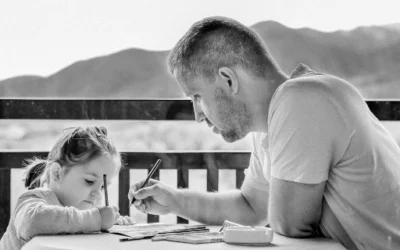We often consider childhood and adolescence as a carefree, fun time — no adult responsibilities, time to explore new interests, and hang out with friends. Yet, children and teens do face a variety of complex life challenges, from bullying, friendship difficulties, academic struggles, social anxiety, coping with loss, discovering who they are, and more.
Some children and teens naturally bounce back from these difficulties, while others struggle. For those children and teens, the issues may lead to self-doubts, stress, changes in behaviour, and emotional distress.
So why do some children and teens go through difficulties easier than others?
One difference is that those who can bounce back from life challenges are using resilience skills. The good news is that young people can learn resilience skills. And parents can help in building resilience in their children and teens.
What is resilience?
Resilience is our ability to overcome and manage hardships and stress. It is a skill that can be taught, learned, and strengthened. Everyone can benefit from developing and building resilience, including young children, adolescents, young adults, and adults.
Why is resilience important?
Building resilience in children and teens can help them effectively manage stress and feelings of anxiety or uncertainty. It can also help them cope with and adapt well to life challenges and adversity.
Resilient children and teens are:
- Less vulnerable to experiencing mental health problems
- May heal faster from difficult situations, like trauma, bullying, or disappointments
- Better able to recover and work through emotional difficulties, including anxiety, depression, and stress
- More confident in themselves
- Better able to handle hardships they may encounter in their everyday life
- Less likely to use unhealthy coping strategies to deal with stress, like risky behaviours, substance abuse, or self-harm
However, being resilient doesn’t mean your child or teen won’t experience grief, sadness, or difficulties. But it does mean they will have the skills and confidence to be proactive in how they manage the situations.
Common signs of resilience
Resilient children and teens seem to bounce back well from setbacks and can handle life’s challenges and tough times compared to many of their classmates and peers. This doesn’t mean that they always handle situations and stress in the best way. However, they do tend to recover well overall and often have different ways of handling difficulties.
Some behaviours and traits associated with resilience include:
- Strong moral compass
- Optimism and belief that things can improve
- Feeling social connected
- Sense of gratitude
- A willingness or desire to help others
- Self-confidence
- Ability to accept change
- Feeling a sense of control
- Having effective coping skills
- Ability to use their social support network
11 Effective Strategies for Building Resilience in Children and Teens
Building strong resilience skills in children and teens can help your child become a well-adjusted, successful adult. Additionally, it can set them up on a life journey of acquiring and strengthening resilience skills. Because we can be resilient in some aspects of our lives, but not all.
Here are 11 tips for building resilience in children and teens.
1. Create open, nonjudgmental communication habits
Discussing difficult emotions and feelings, like pain, shame, fear, sadness, and worries, can be hard, but it helps.
Let your child or teen know that you’re there for them and that they can freely share what’s on their mind or how they’re doing. Listen carefully to what they’re saying and provide empathy as needed. Validate their emotions and experiences.
While it can be challenging, try not to step in to solve the problem or dismiss it immediately. Instead, ask your child or teen age-appropriate questions about why they may feel that way, what helps, and what doesn’t help.
Let them know that everyone experiences various emotions and that it’s okay not to feel okay sometimes. Remind them that the difficult feelings will pass, and point out what actions they are taking that help them, like talking with you. You can also reassure them that you will help them figure it out.
Your child and teen will know they can turn to you for help, which provides a sense of security and can further build confidence and feeling connected.
2. Help them develop effective coping and emotional regulation skills
Learning a variety of coping and problem-solving strategies can ensure your child or teen can handle many of life’s stresses and challenges.
Talk with them about age-appropriate strategies you use and ask them what they already do that helps. Some techniques that can help include:
- Discussing the process of problem-solving big and small difficulties.
- Promote self-soothing and calming skills, like sitting with their pet, using deep breathing techniques, reading a favorite book, or engaging in an activity they enjoy, like walking or yoga.
- Encourage them to engage in a mindfulness practice that helps them focus on the present rather than the past, which they can’t undo.
- Practice gratitude.
3. Encourage healthy thinking strategies and habits
When faced with hard times and uncertainty, we all tend to focus on the negative, which can increase self-doubts and negative self-talk. You can help your child learn to identify these unhelpful thinking patterns and develop healthy strategies to counter these thoughts and habits.
Some strategies that may help include:
- Helping your child or teen accept that change, uncertainty, and difficulties are part of life.
- Identifying what’s in their control and not in their control.
- Helping them focus on what’s in their control so they can work through the issue and move forward.
- Remind them that they’ve overcome difficult situations and changes in the past, and while the current situation is hard, they will make it through.
- Encourage them to treat themselves with kindness.
4. Teach them how to effectively express their emotions
In addition to modeling healthy communication patterns, you can help them develop tools to effectively express their emotions so they feel heard and understood — because there is no “wrong” way to feel. Additionally, listening openly to their feelings can help validate their emotional experiences.
Some strategies that can help include:
- Learning to notice and identify the emotion
- Identifying and understanding how different emotions impact your body, thoughts, and behaviours
- Taking time to identify what caused the feeling which will give them insights into how to handle it
- Exploring ways they can use to process their feelings, like drawing, journaling, or venting
5. Encourage meaningful social connections
Developing strong social connections can help your child or teen feel connected, minimize loneliness, and provide opportunities to practice empathy, listening skills, and how to support others. Additionally, their connections with friends, peers, and family can provide people they can turn to when they need support.
However, it’s not the number of social connections that matters but the quality of the connection.
6. Make time to do things for others
Doing things for others can help your child or teen feel empowered, provide perspective on their life, and show how they can actively make a difference. Look for age-appropriate opportunities to volunteer, but also point out how doing small things for others, like smiling, saying an encouraging word, or opening a door, also helps.
7. Build self-care skills
Helping your child develop self-care skills can build their confidence and increase their well-being. This step can include teaching them basic self-care, like daily routines, developing healthy sleep habits, and eating properly.
You also can help them develop effective coping and stress management skills. For example, you can explore relaxation and meditation tools appropriate for their age.
8. Teach them how to set and work towards reasonable goals
Learning how to set and work toward goals one step at a time is a valuable skill. It can help children and teens understand how to break down tasks, problem-solve difficulties they encounter, and build confidence.
Additionally, talk with them about the types of goals they have and the importance of setting smaller steps towards goals that are within their control. Support them as they work towards short- and long-term goals, including pointing out what they’re doing well. You can also be a safe place for them to discuss their feelings and thoughts when they don’t achieve a goal or have to change it.
9. Help them keep life in perspective
When dealing with difficult times, it’s easy to lose perspective on what’s going well in our lives. You can help your child or teen regain perspective, which can help them maintain an overall hopeful outlook on themself and their life.
For adolescents and teens, you can help them explore the situation in a broad context to help them develop a long-term perspective. For example, you can help them identify a similar or other difficult situation in the past and how they overcame or moved beyond it. Or you can use the situation to help further their self-discovery and identify how this experience can help them grow.
For younger children who aren’t ready to consider a more long-term perspective, you can help them see that things will improve and that this is only one moment in life.
Having an optimistic outlook can help children and teens be more open to seeing the good in life, providing comfort and support when dealing with hardships.
10. Encourage a positive self-view and remind them of their strengths
When dealing with disappointments, stress, or challenges, people can tend to put themselves down or remind themselves of past failures, which doesn’t help them deal with the current situation.
Instead, help remind your child or teen of how they’ve handled past difficulties. Point out how these past experiences can help them handle current and future challenges. Let them know what you see as their emotional and problem-solving strengths, and give them examples. Additionally, have them highlight what they see as their strengths. You can also use these discussions as opportunities for self-discovery, allowing them to learn things about themself, such as what they do when faced with a challenge.
These discussions can help them build confidence and trust in themselves as problem-solvers who can make good decisions and handle difficulties.
11. Explore how to accept change
Change can be hard, especially for children and teens. Explore with them how change is a part of life and how change can even inspire new goals to replace unattainable ones.
Some strategies to help them learn how to accept change include:
- Helping them look at situations and change openly
- Examining what is going well
- Expressing their thoughts and feelings about the change to a trusted, supportive person
- Learning how to create a plan of action for things that aren’t going well
Additionally, you can highlight ways they’ve successfully handled changes in the past to build their confidence and self-worth further.
Work on building resilience as a family
Everyone can benefit from strengthening their resilience. In fact, one critical factor that helps support resilience is having strong connections with family and friends. A 2023 resilience in Canada study found that Canadians who reported consistent, good social relationships with family and friends scored higher on self-rated resilience (80%) than those who only had good relationships sometimes (41%) [1].
As a parent, your bond with your child and teen is essential and can help create a strong foundation of support, caring, and self-worth that can allow your child or teen to thrive [2]. You can help your child or teen see the power of resilience by showing them how to use resilience and modeling resilience skills. Additionally, you can talk with them about helpful and unhealthy coping mechanisms, teach them to express their emotions, help them acknowledge their strengths, and practice self-compassion.
Your child or teen can build and strengthen their resiliency. Our therapists can assist your child or teen in further developing their resilience skills and provide you with parenting support as you guide them.
Sources
1. Mental Health Research Canada. Resilience in Canada (Infographic). https://static1.squarespace.com/static/5f31a311d93d0f2e28aaf04a/t/641ddbc78514b56f6ad5144c/1679678408576/24March2023_Resilience.pdf (Accessed March 11, 2024)
2. Rao, N. & Fisher, P.A. (2021). The impact of the COVID-19 pandemic on child and adolescent development around the world. Society for Research in Child Development, 92 (5), 738-748. https://doi.org/10.1111/cdev.13653 (Accessed March 11, 2024)







